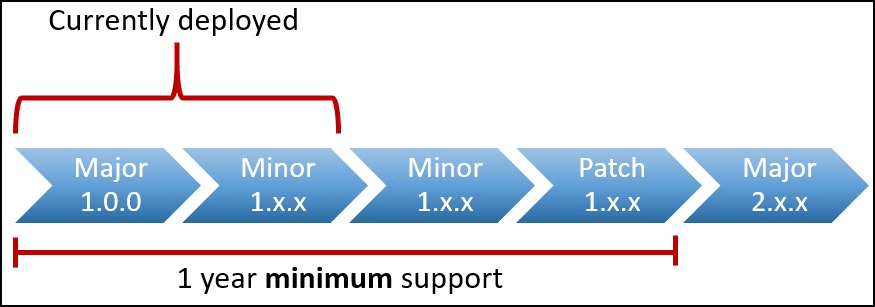Version - Support policy
This document describes the PDF Services SDK's and Public API's versioning and support policies.
SDK
Versioning scheme
The SDK has a version format of #.#.# (e.g. 1.1.0) where the numbers correspond to a major release, minor release, and patch/update (Major.Minor.Patch). Releases are defined as follows:
- Major Releases (1.x.x): Major releases introduce backward-incompatible changes to the APIs and interfaces and start the EOL clock for all previous releases. Developers should plan on migrating their code prior to the end of life of the previous major release.
- Minor Releases (x.1.x): Minor releases typically appear quarterly. Changes are backward compatible to the last major release. Minor releases introduce new interfaces. Existing interfaces continue to function but some interfaces may be deprecated; deprecated interfaces will be removed in a next major release.
- Patch Releases (x.x.1): Patch releases only deliver critical security or bug fixes as needed. Patch release changes are rolled into the next minor release so that developers can update and deploy new code based on their business requirements.
Support
Adobe always recommends that you use the latest product version (Major.Minor.Patch) since it is always the most functional and most secure. To support existing applications that may take time to migrate, The SDK team adheres to a support policy that ensures deployed versions continue to function securely as follows:
- Every Major/Minor Version is supported for one year after the
release of a newer Major/Minor Version; that is a Major.Minor.X
version reaches its end of life 1 year after the next Major/Minor
Release. For example, If there are 1.2.0 (Minor), 1.3.0 (Minor) and
2.0.0 (Major) releases in sequence then,
- 1.2.0 becomes unsupported 1 year after the release of 1.3.0.
- 1.3.0 becomes unsupported 1 year after the release of 2.0.0.
- Security patches and critical bug fixes are generally provided for the last dot release of the supported major versions. For example, if supported versions are 1.2.1, 1.3.1 and 2.0.0, only the 1.3.1 and 2.0.0 release would receive a security update. As a best practice, deployment on a supported major release should migrate to the last minor update for that release.
Once a version reaches its end of life, functionality may be deprecated and stop working.

Public API
Versioning
As mentioned on Public API Docs, each operation has a unique assetId which is passed in Form Parameters. Generally, APIs will be enhanced while keeping them backward compatible. If its functionality can't be enhanced without breaking changes, then its new version will be released with its own unique assetId. The supported older API versions info will be present on Public API Docs
Additionally, the output for the PDF Extract API is generated by a machine learning pipeline that is frequently trained to improve inference of document layout and structure.As a result, while changes to the output structure are not expected between versions, specific results may vary as the model output improves.
Support
With the evolution of our APIs, a new version of the API may contain non-backward compatible changes and we recommend adoption of a new version upon its release. The previous version of the API will be supported for one year after the release of a new version. Adobe will use reasonably commercial efforts to provide 12-months’ notice of deprecation, unless extenuating circumstances prompt a shorter notice period. Notices will be updated from time to time here, and it is your sole responsibility to check for updates from time to time. After the deprecation notice, no new enhancements are made to the service. Adobe reserves the right to modify, deprecate, or discontinue the service, in whole or in part, at any time.
Once a version reaches its end of life, functionality may be deprecated and stop working.
Deprecated docs - past versions
Only the latest documentation is typically available online. Refer to the Documentation Library for links.
Legacy docs for all past releases are not maintained. Some links may be broken and content may be outdated.
